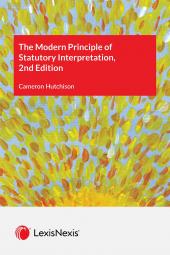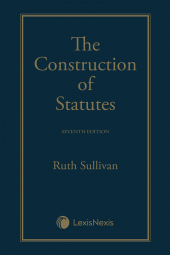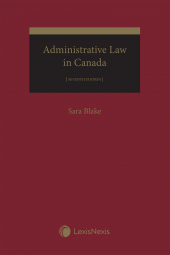The Modern Principle of Statutory Interpretation, 2nd Edition
The “modern principle” is the official approach to statutory interpretation in Canada, which focuses on the language of a statutory provision in light of its purpose, intent and context. This title is a must-have resource for anyone seeking to gain insight into statutory interpretation in Canada. Formerly published as The Fundamentals of Statutory Interpretation.
One Year Subscription Only Terms
Subscribers receive the product(s) listed on the Order Form and any Updates made available during the annual subscription period. Shipping and handling fees are not included in the annual price.
Subscribers are advised of the number of Updates that were made to the particular publication the prior year. The number of Updates may vary due to developments in the law and other publishing issues, but subscribers may use this as a rough estimate of future shipments. Subscribers may call Customer Support at 800-833-9844 for additional information.
Subscribers may cancel this subscription by: calling Customer Support at 800-833-9844; emailing customer.support@lexisnexis.com; or returning the invoice marked 'CANCEL'.
If subscribers cancel within 30 days after the product is ordered or received and return the product at their expense, then they will receive a full credit of the price for the annual subscription.
If subscribers cancel between 31 and 60 days after the invoice date and return the product at their expense, then they will receive a 5/6th credit of the price for the annual subscription. No credit will be given for cancellations more than 60 days after the invoice date. To receive any credit, subscriber must return all product(s) shipped during the year at their expense within the applicable cancellation period listed above.
Product description
The “modern principle” is the official approach to statutory interpretation in Canada, which focuses on the language of a statutory provision in light of its purpose, intent and context. The Modern Principle of Statutory Interpretation, 2nd Edition (formerly published as The Fundamentals of Statutory Interpretation), is a must-have resource for anyone seeking to gain insight into statutory interpretation in Canada.
Written in an accessible, easy-to-understand manner, The Modern Principle of Statutory Interpretation, 2nd Edition is particularly useful because it:
- Examines the textual, contextual, historical, and purposive components of the modern principle, as well as their interaction with one another
- Presents some refinements to the modern principle to better understand legislative intent as well as pragmatically resolve ambiguous cases
- Considers why statutes require interpretation and the institutional legitimacy of the judiciary to interpret statutes
- Combines the best aspects of a textbook and a casebook as it includes detailed commentary and analysis of the subject matter, and not just case references
- Highlights key elements from leading cases by presenting the most definitive precedents for each aspect of statutory interpretation
What’s New In This Edition
- New content addressing legislative drafting conventions and their relationship to interpretative rules
- New content on the challenges presented by, and potential solutions to, the interpretation of general or broadly worded language on the one hand, and overly specific language on the other
- Clarity around the precise role of ambiguity and absurdity, as well as when courts may resort to statutory presumptions
- Updated case law, including discussion of Supreme Court of Canada cases
Who Should Read This Book
- Litigation lawyers when determining how courts have used principles of interpretation in past cases to help guide their litigation strategy
- Tribunal members and judges when dealing with interpretation issues
- Law students who need to learn the fundamentals of statutory interpretation
- Law libraries serving students, lawyers, policymakers and the judiciary, who may not deal with questions of interpretation on a regular basis
Table of contents
Introduction
Chapter 1: Foundations
1.01 Introduction
1.02 What is Legislation?
1.03 What is Statutory Interpretation?
1.04 Why Do Statutes Require Interpretation?
1.05 The Judicial Role in Statutory Interpretation
1.06 Statutory Interpretation and Legal Reasoning
1.07 The Interpretation Act
Chapter 2: The Modern Principle
2.01 Introduction
2.02 Approaches and Aids to Interpretation
2.03 The Modern Principle
2.04 The Modern Principle Refined
Chapter 3: Textual Meaning
3.01 Introduction
3.02 The Nature of Legislative Text
3.03 Defined Meaning
3.04 Ordinary Meaning
3.05 Technical or Special Meanings
3.06 Textual Presumptions
3.07 Maxims of Interpretation
3.08 Punctuation and Components
Chapter 4: Contextual Meaning
4.01 Introduction
4.02 Statutory Context
4.03 Legal Context
4.04 External Context
Chapter 5: Legislative History
5.01 Introduction
5.02 The Uses of Legislative History
5.03 Types of Legislative History
Chapter 6: Purpose
6.01 Introduction
6.02 Statutory versus Specific Purposes
6.03 Where Do You Find Statutory Purpose?
6.04 When Statutory Purpose Supports an Interpretation
6.05 When Statutory Purpose Yields Equivocal Interpretations
Chapter 7: Temporal Application
7.01 Introduction
7.02 When Statutes Come into Force
7.03 When Statutes are Ambiguous about their Application to Past and In-Progress Events or Situations
7.04 A New Approach to Temporal Application
Index
 Lexis Nexis
Lexis Nexis 



